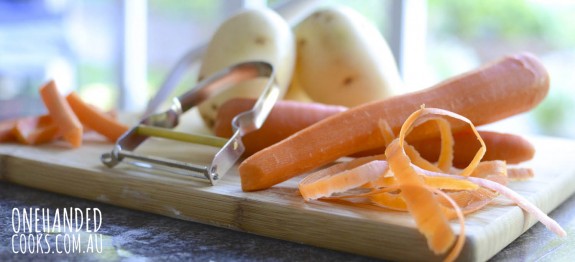To Peel or Scrub?
For some fruits and vegetables it is obvious. Who eats a banana with the peel on or bites into an orange before peeling the rind? For some it is less so. It may be habit or rather a preference that you peel your carrots before you prepare them. For other vegetables it may be the way you like to enjoy them that will determine whether you peel or scrub – peel potatoes to mash them or just scrub them clean and leave the skin on for roast jacket potatoes.
Regardless of how you cook and prepare your vegetables some of their nutrients and antioxidants will be lost, particularly vitamin C, folate and some B vitamins as they are are very unstable and heat sensitive. Therefore when cooking your vegetables for the shortest time possible in a small amount of water.
For many fruits and vegetables the peel is rich in potent antioxidants important for our health, a concentrated source of vitamins and minerals and an excellent source of fibre. How much valuable nutrition are you throwing away?
So how can you retain such valuable nutrition?
Only peel your vegetables when necessary (e.g. for some baby purees)
- Always wash your fruit and vegetables to remove any dirt, unwanted chemical and pesticide residues and to reduce the exposure to microorganisms that can make you sick. This is important whether you peel them or not. Cool tap water is sufficient as soap and detergents can affect the taste.
- e.g Carrots are often peeled but are perfectly fine to eat washed and unpeeled.
Peel vegetables after you have cooked them.
- For some vegetables this can prevent leaching of valuable antioxidants into the cooking water.
- e.g. By peeling the skin from beetroot after you have boiled or roasted them you have retained many of the antioxidants from the flesh you may have otherwise lost.
Cut fruit into pieces rather than peeling the skin
- Cut fresh fruit will often be more appealing to toddlers and children but try leaving the skin on at times providing more antioxidants, nutrients and fibre.
Offer the peel separate to the fruit
- e.g Older children may like to enjoy munching on long ribbons of apple peel separate to the fruit.
Retain the cooking water
- While many of the nutrients may have leached out into the cooking water, reserving this for stock, soups or to thin out baby purees.
Store your vegetables appropriately
- To maintain freshness and nutritional value.
Buy small amounts often
- The nutritional value of fruits and vegetables decline as soon as they are picked or harvested so eating them as soon as possible after you have bought them will give you the most benefits.
Fresh may not always best
- For some vegetables frozen options can be preferable nutritionally.
- e.g. Frozen spinach retains its nutrients and flavour so can be even more nutritious than the fresh bunch that has been sitting in your fridge all week.
- e.g The natural sugars in fresh garden peas turn to starch soon after they are picked and podded so frozen peas not only convenient but are just as good as freshly picked.





























posted by Rebecca on November 5, 2012
Great post. What about tomatoes for baby purées? Other recipes I have used say to peel the tomatoes, which is a bit of a pain. But I have just made the lentil and red vege purée from this site and it doesn’t mention peeling the tomatoes. Just wondering if it’s necessary?
posted by Jess on November 5, 2012
Hi Rebecca,
Thank you, I’m glad you liked the post. There is no need to peel tomatoes for your baby purees. Although cooking them may help reduce the acidity making them more gentle on your baby’s tummy. I hope your bub enjoyed the lentil and red vege puree!
J x
posted by anthea on February 23, 2015
I am looking into the RPAH Failsafe plan for my grandson, and thank you for providing Failsafe-friendly and Thermomix recipes for me! If offending chemicals like salicylates are in the peel, doesn’t it make sense to peel fruit and veg first?